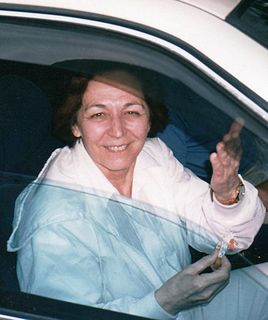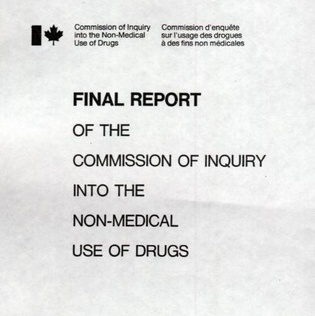Drug policy reform, also known as drug law reform, generally refers to proposed changes to the laws and regulations that governments promulgate with respect to substances that have psychoactive effects or a real or perceived potential to be used for recreational or other non-medical reasons. Proponents of drug policy reform frequently argue that prohibition of recreational drugs—such as cannabis, opioids, cocaine, amphetamines and hallucinogens—has been ineffective and counterproductive and that substance use is better responded to by implementing practices for harm reduction and increasing the availability of addiction treatment. Another reform proposed is to introduce a regulatory regime for the production, marketing, and distribution of some or all currently illegal drugs in a manner analogous to that for alcohol and tobacco.

Cannabis in Canada is legal for both recreational and medicinal purposes. Medicinal use of cannabis was legalized nationwide under conditions outlined in the Marihuana for Medical Purposes Regulations, later superseded by the Access to Cannabis for Medical Purposes Regulations, issued by Health Canada and seed, grain, and fibre production was permitted under licence by Health Canada. The federal Cannabis Act came into effect on 17 October 2018 and made Canada the second country in the world, after Uruguay, to formally legalize the cultivation, possession, acquisition and consumption of cannabis and its by-products. Canada is the first G7 and G20 nation to do so.

In the United States, the non-medical use of cannabis is legalized in 18 states and decriminalized in 13 states as of June 2021. Decriminalization refers to a policy of reduced penalties for cannabis offenses, typically involving a civil penalty for possessing small amounts, instead of criminal prosecution or the threat of arrest. In jurisdictions without penalty the policy is referred to as legalization, although the term decriminalization is sometimes used for this purpose as well.

The legal history of cannabis in the United States pertains to the regulation of cannabis for medical, recreational, and industrial purposes in the United States. Increased restrictions and labeling of cannabis as a poison began in many states from 1906 onward, and outright prohibitions began in the 1920s. By the mid-1930s cannabis was regulated as a drug in every state, including 35 states that adopted the Uniform State Narcotic Drug Act. The first national regulation was the Marihuana Tax Act of 1937.

Drug liberalization is the process of decriminalizing or legalizing the use or sale of drugs. Variations of drug liberalization include: drug legalization, drug re-legalization and drug decriminalization. Proponents of drug liberalization argue that the legalization of these would make them more widely available, eradicating the drug market and reducing the law enforcement costs and incarceration rates.

The use, sale, and possession of cannabis over 0.3% THC in the United States, despite laws in many states permitting it under various circumstances, is illegal under federal law. As a Schedule I drug under the federal Controlled Substances Act of 1970, cannabis over 0.3% THC is considered to have "no accepted medical use" and have a high potential for abuse and physical or psychological dependence. Cannabis use is illegal for any reason, with the exception of FDA-approved research programs. However, individual states have enacted legislation permitting exemptions for various uses, including medical, industrial, and recreational use.

Canada's drug regulations are measures of the Food and Drug Act and the Controlled Drugs and Substances Act. In relation to controlled and restricted drug products, the Controlled Drugs and Substances Act establishes eight schedules of drugs and new penalties for the possession, trafficking, exportation and production of controlled substances as defined by the Governor-in-Council. Drug policy of Canada has traditionally favoured punishment of the smallest of offences, but this convention was partially broken in 1996 with the passing of the Controlled Drugs and Substances Act.

Cannabis in California has been legal for medical use since 1996, and for recreational use since late 2016. The state of California has been at the forefront of efforts to liberalize cannabis laws in the United States, beginning in 1972 with the nation's first ballot initiative attempting to legalize cannabis. Although it was unsuccessful, California would later become the first state to legalize medical cannabis with the passage of the Compassionate Use Act of 1996. In November 2016, California voters approved the Adult Use of Marijuana Act to legalize the recreational use of cannabis.
Marc-Boris St-Maurice is an activist, politician and Canadian musician, who has campaigned for many years for the legalization of cannabis, and to facilitate access to the drug for health reasons. He lives in Montreal, Quebec.

Marie-Andrée Bertrand was a French-Canadian criminologist, a feminist and anti-prohibitionist.

The legal history of cannabis in the United States began with state-level prohibition in the early 20th century, with the first major federal limitations occurring in 1937. Starting with Oregon in 1973, individual states began to liberalize cannabis laws through decriminalization. In 1996, California became the first state to legalize medical cannabis, sparking a trend that spread to a majority of states by 2016. In 2012, Washington and Colorado became the first states to legalize cannabis for recreational use.

Cannabis in Massachusetts is legal for medical and recreational use. It also relates to the legal and cultural events surrounding the use of cannabis. A century after becoming the first U.S. state to criminalize recreational cannabis, Massachusetts voters elected to legalize it in 2016.

In the U.S. state of Maine, marijuana (cannabis) is legal for recreational use. It was originally prohibited in 1913. Possession of small amounts of the drug was decriminalized in 1976 under state legislation passed the previous year. The state's first medical cannabis law was passed in 1999, allowing patients to grow their own plants. The cities of Portland and South Portland decriminalized the possession and recreational use of marijuana in 2013 and 2014, respectively.
The list includes and details significant events that occurred in the global history of national-level implementations of, or changes made to, laws surrounding the use, sale, or production of the psychoactive drug cannabis.

The Cannabis Act (C-45) of June, 2018 paved the way to the legalization of cannabis in Canada on October 17, 2018. Police and prosecution services in all Canadian jurisdictions are currently capable of pursuing criminal charges for cannabis marketing without a licence issued by Health Canada. The Supreme Court of Canada has held that the federal Parliament has the power to criminalise the possession of cannabis and that doing so does not infringe the Canadian Charter of Rights and Freedoms. The Ontario Court of Appeal and the Superior Court of Ontario have, however, held that the absence of a statutory provision for medical marijuana is unconstitutional, and to that extent the federal law is of no force and/or effect if a prescription is obtained. The recreational use of cannabis has been legalized by the federal government, and took effect on October 17, 2018.

The Cannabis Act is a law which legalized recreational cannabis use in Canada in combination with its companion legislation Bill C-46, An Act to Amend the Criminal Code. The law is a milestone in the legal history of cannabis in Canada, alongside the 1923 prohibition.

On October 17, 2018, cannabis was legalized in Canada for recreational and medical purposes. It was already legal for medicinal purposes, under conditions outlined in the Marihuana for Medical Purposes Regulations issued by Health Canada, and for seed, grain, and fibre production under licence by Health Canada.

Cannabis in Prince Edward Island became legal when the national Cannabis Act went into force on October 17, 2018.

Cannabis in Saskatchewan became legal when the national Cannabis Act went into force on 17 October 2018.

Cannabis in the Northwest Territories became legal when the national Cannabis Act went into force on 17 October 2018.











